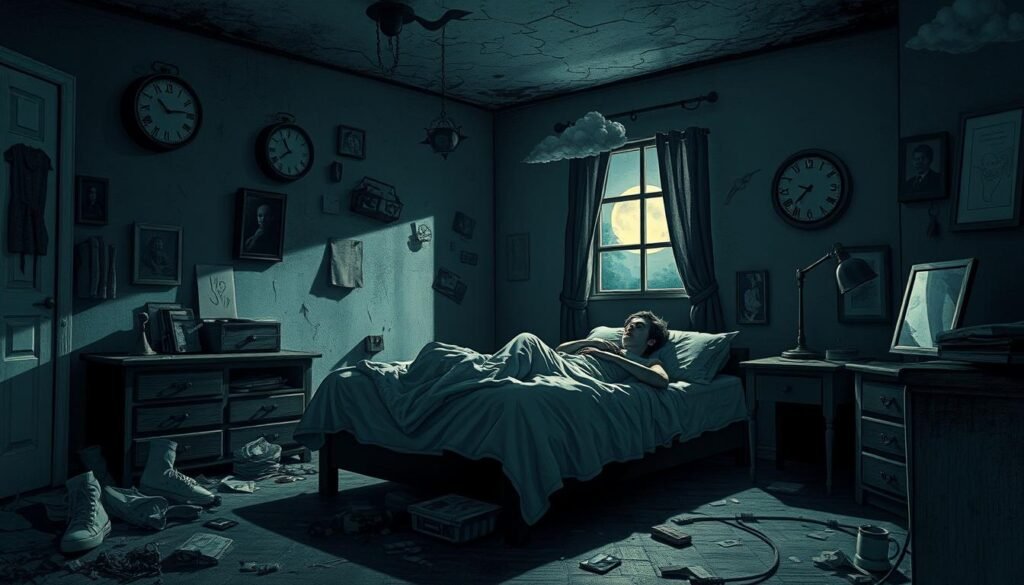Did you know 70-80% of people will face a traumatic event in their lives? This fact shows how common psychological trauma is. It deeply affects mental health. People dealing with trauma often struggle with sleep too. This makes studying the link between trauma and sleep crucial.
Learning how trauma affects sleep can greatly help with trauma recovery. Trauma comes in many forms and affects people differently. It can cause insomnia, nightmares, and tiredness. Understanding this relationship can lead to better sleep and mental health.
Today, we’ll talk about ways to sleep better while recovering from trauma. We will also discuss how important professional help is in this journey. For those experiencing trauma, this might be a step towards better sleep and healing.
Key Takeaways
- Psychological trauma can significantly disrupt sleep patterns and quality.
- Insomnia and nightmares are common sleep disorders associated with traumatic experiences.
- Childhood trauma can lead to long-lasting effects on mental health and sleep quality.
- Establishing a regular sleep routine is crucial for recovery.
- Professional support can enhance coping strategies and sleep improvement.
- Engaging in mindfulness and relaxation techniques can help manage trauma symptoms.
The Connection Between Psychological Trauma and Sleep
Psychological trauma greatly affects a person’s sleep. Traumatic events, especially in childhood, can mess up sleep patterns. These disturbances often lead to insomnia, nightmares, or restless nights.
Research found adults with more childhood traumas had worse sleep quality. This link exists even after accounting for stress and depression. An alarming number of adults in the U.S., between 50 to 70 million, face sleep issues. Many of these problems stem from childhood traumas.
PTSD can severely impact sleep due to increased anxiety and constant alertness. This makes it hard to relax, leading to more stress and anxiety. Simple changes like a bedtime routine, less screen time, and mindfulness exercises can help improve sleep.
It’s important to understand how trauma affects sleep for healing. Finding and treating trauma-related sleep problems is key to better sleep and health.
Understanding Psychological Trauma: Causes and Effects
Psychological trauma often comes from events that deeply shake a person’s sense of safety. About 70% of U.S. adults have lived through a traumatic event. Events are seen as either “Big T” trauma, like assaults or natural disasters, or “little t” trauma, such as ongoing emotional abuse or bullying. Both can greatly upset emotional well-being and disrupt daily life.
The causes of trauma are many, including acute and complex trauma. Acute trauma follows short, but intense, events like a sudden loss. Complex trauma comes from long-term exposure to tough situations. Factors like family mental health history and life-changing events play a role. They can lead to issues like Post-Traumatic Stress Disorder (PTSD) and Acute Stress Disorder.
Trauma affects people differently, causing problems like anxiety, depression, and a sense of being disconnected. Symptoms might start right after the trauma or years later. They can make personal connections hard and hurt one’s well-being, sleep, and emotional health. Understanding emotional trauma effects helps people come to terms with their feelings. It shows the importance of seeking help and beginning to heal.

How Trauma Impacts Sleep Quality
Trauma can really change how well you sleep. It can make it hard to move through different sleep stages. These stages help our body and mind heal. It’s important to know how trauma impacts sleep to get better rest.
Sleep Architecture Disruption
Trauma can mess up your sleep pattern. It may cause you to get less deep sleep and more light, broken sleep. People who have gone through tough times might find it hard to sleep, like those with bad dreams. About 73% of women who survived sexual assault have trouble sleeping. Veterans with PTSD also face many sleep problems, hurting their health and minds.
The Role of REM Sleep in Trauma Processing
REM sleep is key for dealing with feelings and memories. Trauma can cut short REM sleep, important for overcoming emotional scars. For example, women with PTSD from assaults often have bad dreams and flashbacks. Nearly 63% of these women still have nightmares for weeks. Working through these problems can really help improve sleep quality and healing.
Practicing mindfulness and keeping a good sleep routine can help sleep better after trauma. For more tips, check out this resource.

Common Sleep Disorders Associated with Trauma
Experiencing trauma can lead to sleep problems like insomnia and nightmares. These issues are crucial to address for recovery. It’s important to know how trauma affects sleep. This knowledge helps in finding the right ways to cope and heal.
Insomnia and Nightmares
Insomnia is a big problem for those who have been through trauma. People with it have trouble falling or staying asleep. Around 70% of people with PTSD struggle with insomnia. It makes their stress and alertness even worse.
Many with PTSD also have nightmares that keep coming back. These bad dreams often replay the traumatic event. They make people feel scared and anxious when they wake up. This can really slow down a person’s recovery and lead to bad sleep.
Insomnia and nightmares disturb sleep a lot. They can keep trauma symptoms going. Treating these sleep issues well is key to getting better.
| Sleep Disorder | Prevalence in PTSD Patients | Impact on Recovery |
|---|---|---|
| Insomnia | 70% | Increases hyperarousal and stress |
| Nightmares | 50% – 70% | Intensifies trauma-related anxiety |
| Obstructive Sleep Apnea | 40% – 90% | Complicates PTSD symptoms |
| Periodic Limb Movement Disorder | 33% | Can disrupt restorative sleep |

Recognizing Sleep Disturbances Post-Trauma
Sleep disturbances can be a big problem after trauma. Many who have gone through trauma struggle to sleep well. They may have trouble falling asleep, wake up often, or have bad dreams. These sleep problems could be signs of PTSD, as research shows most with PTSD have sleep issues.
For those with PTSD, about 70% have insomnia. Insomnia means it’s hard to start or keep sleeping, which ruins sleep quality. Between 43.6% and 75.7% of PTSD patients also have sleep apnea. This is much higher than the 5% to 15% in the general public. These high numbers show why it’s important to treat sleep problems in trauma recovery.
Many trauma survivors suffer from nightmares, with rates ranging from 19% to 96%. These nightmares can make depression worse and even lead to suicidal thoughts. Those with PTSD often have less steady sleep and more changes in their sleep patterns, especially if they have insomnia.
Trauma-related sleep disorders are common, especially in combat veterans with PTSD. Studies show that nearly all Vietnam-era veterans have these sleep troubles. Recognizing and treating sleep issues early is vital. It’s an important part of helping those with PTSD, as sleep problems and other conditions, like substance abuse, can affect each other.
Quickly spotting sleep disturbances lets people get the right help. Treatments like Cognitive Behavioral Therapy for Insomnia (CBT-I) have been successful. They improve sleep for those affected by trauma and PTSD. You can learn more about how sleep and trauma are connected here.
Effective Trauma Therapy for Sleep Improvement
Dealing with trauma and sleep issues means finding effective therapies that boost sleep quality. Cognitive behavioral therapy for insomnia (CBT-I) and Eye Movement Desensitization and Reprocessing (EMDR) are great tools. These methods help people facing these tough challenges.
Cognitive Behavioral Therapy for Insomnia
CBT-I is a strong tool in fixing sleep problems tied to trauma. It changes how we think about sleep and our sleep habits. It’s especially helpful for those with insomnia.
Studies show CBT-I works well for those with PTSD and other mental health issues. Since 80-90% of PTSD sufferers struggle with sleep, CBT-I is crucial for their healing.
Eye Movement Desensitization and Reprocessing (EMDR)
EMDR focuses on healing trauma by dealing with bad memories. It uses eye movements to help people process these memories. This can ease sleep issues like nightmares.
People with PTSD see a lot of improvement with EMDR. It highlights the importance of these therapies in helping with recovery.
Practical Tips for Enhancing Sleep Quality During Trauma Recovery
Improving sleep quality is crucial for trauma recovery. Through practical strategies, one can relax better and sleep deeper. Creating a regular sleep schedule and safe environment are key steps.
Establishing a Regular Sleep Routine
Having a regular sleep routine helps improve sleep. Going to bed and waking up at the same times daily teaches the body rest times. This helps regulate your internal clock, easing the process of falling asleep and waking up rejuvenated.
- Set a fixed bedtime and wake-up time, even on weekends.
- Incorporate relaxing activities prior to sleep, such as reading or meditating.
- Avoid heavy meals and caffeine close to bedtime.
Creating a Safe Sleep Environment
A safe sleep space reduces anxiety and aids in restful sleep. A room that promotes relaxation provides comfort and peace for those overcoming trauma.
- Keep the room dark, cool, and quiet to optimize the sleep quality.
- Use comfortable bedding and pillows that provide proper support.
- Limit screen time before bed to reduce the impact of blue light on sleep quality.
By following these strategies, one can significantly better their sleep during trauma recovery. A commitment to a sleep routine and a secure sleeping area helps individuals manage their sleep health effectively.
| Tip Category | Practical Tips |
|---|---|
| Sleep Routine | Set consistent bed and wake times |
| Sleep Routine | Include relaxing pre-sleep activities |
| Safe Sleep Environment | Maintain a dark, cool, and quiet room |
| Safe Sleep Environment | Choose comfortable bedding |
The Importance of Professional Support in Trauma Recovery
Dealing with trauma is tough, and that’s why professional help is key. Qualified therapists and counselors offer vital support. They help people work through their trauma in a healthy way. This can lead to better emotional health and sleep.
Getting professional help can protect against PTSD and depression. Studies show that it can quickly reduce PTSD symptoms. It also lessens the chance of these symptoms coming back. Getting help early can make the recovery process faster.
Love and friendship also play a big part in healing from trauma. Partners, family, and friends offer the support that’s needed during hard times. These relationships help build resilience and improve mental health.
Trauma affects both the mind and body. That’s why care that understands trauma is crucial. Experts in this area help people find ways to cope. They use strategies that support both mental and physical healing.
Professional support improves how people cope with trauma. It helps them stay stable, control their emotions, and keep up healthy relationships. Focusing on personal and environmental needs is key in healing from trauma.
| Type of Support | Benefits |
|---|---|
| Therapy | Provides coping strategies, emotional processing, and symptom reduction. |
| Support Groups | Offers shared experiences, reducing feelings of isolation and promoting normalization. |
| Family and Friends | Enhances emotional support, nurtures resilience, and encourages healthy communication. |
| Online Resources | Accessible information and community for those seeking help and advice. |
In the end, professional support is crucial in healing from trauma. It combines mental health care with strategies to build resilience and manage symptoms. Making it a priority can speed up the healing process.
Conclusion
Understanding how trauma affects sleep is key for effective recovery. This article shows that noticing sleep problems caused by trauma helps people find the right therapy. By improving sleep, individuals can progress in their healing.
Readers get practical tips and learn the value of seeking expert advice. Healing from trauma’s emotional and sleep issues is crucial for better health. Good sleep helps in overcoming trauma and boosting mental health.
Dealing with trauma and sleep challenges needs awareness, support, and caring for oneself. Using the advice from this article, people can improve their sleep and build strength against trauma’s effects.